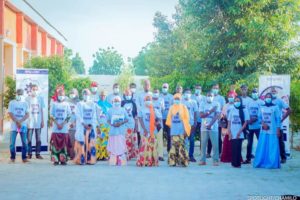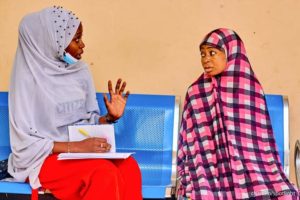By Baba Machina
Yobe State, in its commitment to achieving Universal Health Coverage (UHC), embarked on the implementation of the Basic Healthcare Provision Fund (BHPF) in 2021. With a substantial allocation of N513 million, the State aimed to enhance healthcare accessibility and quality. However, Muhammad Kemi, Program Lead of a Citizens-Led Tracking Campaign under the Spotlight for Transparency and Accountability Initiative, claims there are hurdles hindering the successful realization of UHC in the State.
According to the findings of the initiative, poor accountability and transparency in the implementation process, particularly at accredited primary health facilities in rural communities, are impeding the effective utilization of the BHCPF funds.
To address this pressing issue and ensure the efficient and effective implementation of the BHCPF, independent oversight and access to information become paramount. Recognizing this need, the Citizens-Led Tracking Campaign was initiated. The Citizens-Led Tracking Campaign set out to bridge the gap between the BHCPF implementation and effective healthcare delivery by mobilizing citizens (known as community champions) at the grassroots level, utilizing data-driven advocacy.
Employing digital technology to drive accountability
In a groundbreaking approach, the Spotlight for Transparency and Accountability Initiative utilized digital technology, including Open Data Kit (ODK) and Kobo Collect, to generate and collect data from health facilities. This data was then analyzed and visualized using OpenStreetMap, creating heat maps that pinpoints the project’s implementation locations.
“This unique solution empowers champions to track healthcare funding; promoting accountability and transparency, and setting a new standard for healthcare service delivery in the State,” stated Aliyu Usman Dagona, one of the initiative’s community champions.
Community champions go through capacity building workshops and are linked with community stakeholders to monitor the disbursement and document the implementation of the Basic Health Provision Fund in accredited healthcare facilities. They document how the allocated and released funds correspond with the services provided to low-income and vulnerable individuals covered by these health facilities. When there are discrepancies, the community champions organize town hall meetings.
“As the community champions, we share the data and information collected at the health facilities with residents of the community and provided feedback to the government agency responsible for the implementation of the fund’’. Says Aliyu Usman Dagona, Program Manager, Spotlight for Transparency and Accountability Initiative.

According to Dagona, between December 2021 and November 2022, the champions tracked the implementation of the BHPF in 30 communities. Some of these communities include: Gashaka, Fika, Gadaka, Godowoli and Kukar Gadu. As a result of the tracking and monitoring of the fund at the accredited centers. ‘’We found that over N90 million was earmarked whereas N50 million earmarked for the maintenance and procurement of equipment under the National Primary Healthcare Management Agency Gateways, N40 million spent for the purchases of the services by Yobe State Contributory Healthcare Management Agency under the National Health Insurance Scheme (NHIS) and prompt and timely release of this fund on quarterly basis’’ Mr. Aliyu added.
Five town hall meetings
Biliyaminu Suleiman, a community champion, highlighted that before the initiative, beneficiaries had limited access to information about healthcare services; exacerbating the conditions of vulnerable groups, particularly children under five and pregnant women in the rural communities. As a direct intervention, the community champions organized series of town hall meetings in five communities with accredited health facilities in Fika. The town hall was attended by community leaders, health personnel, persons with disabilities (PLWDs), women and youth groups, and two representatives from each group as the targeted beneficiaries.
Suleiman explained that the representatives, who receive information during these town hall meetings, disseminate it to their families, enabling them to access the needed healthcare services. Notably, the town hall meetings facilitated the collection of new data on the actual beneficiaries by the Yobe State Contributory Healthcare Management Agency. As a result, 70,000 beneficiaries were enrolled, despite their absence from the National Vulnerability List, which previously excluded them from the BHCPF.
Aisha Faruk, a Program Lead, shared that the advocacy efforts of community champions led to the enrollment of 32,000 low-income and vulnerable individuals into the State Social Equity program. Furthermore, the State government approved N200 million to expand the Health Equity Program, which included the procurement of high-quality drugs for accredited health facilities that previously faced shortages.

The impact of the Citizen-Led Tracking Campaign initiatives can be seen through the stories of those directly benefiting from the improved healthcare services. In one community at the Fika local government, beneficiaries, including pregnant women, parents with young children, and elderly individuals, were seen patiently waiting outside the accredited healthcare facility. The presence of these individuals demonstrated the increased awareness and utilization of the Basic Healthcare Provision Fund (BHCPF) services.
At one of the centers, Fatima Muhammad, a young mother, comes along with her children suffering from malaria. Fatima came to the facilities at exactly 8:30 am. ‘’My child is suffering from malaria and I’m here for her treatment and received some drugs’’ I never knew that I’m eligible for these services because we don’t know how it works and nobody informs us about it until when we attended town hall meeting organized by the community champions. She added.
Another beneficiary Musa Yakubu, an aged man at the health center who came from a small distance with his family for a hypertension test and malaria treatment for his children confirmed the statement made by Fatima Muhammad saying that they don’t have information that such services are provided at the facility.
‘’My elder brother came and told me community leaders are requesting we come out and attend a town hall meeting and that is how I got the information and now enrolled and we have shared the information to those who cannot afford malaria drugs because of its price are now enrolled to be benefit from the services’’. We are just happy, he added.
Similarly, in the Bade local government area, where the initiative was implemented, residents like Haruna Adamu, an elderly man, expressed relief at the availability of diabetes screening facilities and adequate healthcare personnel attending to patients.

Talba Adamu, an expert in social accountability and Advocacy Officer of the Lafiya Programme, commended the initiative, emphasizing the importance of accountability and transparency in improving healthcare service delivery and achieving Universal Health Coverage. He highlighted that trust between service providers and receivers is crucial for achieving these goals and encouraging philanthropic donations to further improve service delivery.
Despite the positive impact, the initiative faces challenges when expanding to other local governments. One significant challenge is the scarcity of community champions who can effectively track and monitor the implementation of the BHCPF in accredited healthcare centers. However, with support from the MacArthur Foundation and the Center for Information and Technology, the initiative aims to overcome these challenges and expand its reach.
The Citizen-Led Tracking Campaign initiatives have brought about significant improvements in healthcare service delivery, empowering communities and ensuring that vulnerable populations receive the care they need. By promoting transparency, accountability, and access to information, the initiative sets a positive example for other regions and fosters a culture of trust and improved healthcare outcomes.
This story was produced in partnership with Nigeria Health Watch through the Solutions Journalism Network, a nonprofit organisation dedicated to rigorous and compelling reporting about responses to social problems.















